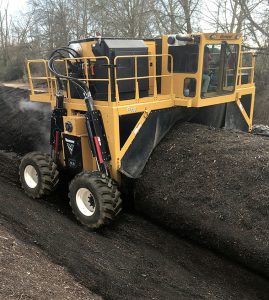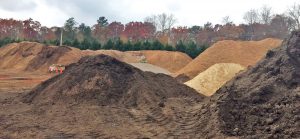How a company that started as a small tree care service in the late 1980s evolved into a compost and mulch manufacturer with multiple facilities in the Southeast U.S.
Matt Eul
BioCycle January 2018

Cowart, Inc.’s facility in Athens, Georgia composts yard trimmings and preconsumer food waste in windrows. It uses a Vermeer turner.
Our growth since the beginning can be summed up pretty easily — we’ve gone where our customers have needed us to go,” explains Chris Cowart, owner of Cowart, Inc., a large producer of high quality composts and mulches and provider of tree care services in the Southeast region of the United States. Cowart opened its doors as a small tree care service provider in 1987. Finding a better solution to use all the wood chips that the crews were creating led Cowart to add mulch products to the company’s offerings in the late 1990s. Cowart Tree Experts then became better known as Cowart Mulch Products, Inc. — a familiar brand seen on bagged mulch in many retail stores, and a name that can be seen on the side of trucks traveling around the region.
To aid in the transition to mulch production, Cowart purchased a Vermeer TG800 tub grinder, which is still in operation. And three years ago, seeing significant opportunity for growth, he expanded the company’s services into composting. The company now operates a fleet of more than 900 machines, has seven locations and employs more than 100 people. Its Tennessee facility, five Georgia locations and its newest addition in Florida, all take in tree waste from public and private sources. Each location is equipped to process the material, but only its facility in Athens, Georgia is used for composting.

Compost is used in the company’s soil blends that are bagged, as well as in customized mixes sold in bulk.
Move Into Composting
“We got started in the composting industry by offering different soil blends to our customers along with our mulch products,” explains Cowart. “Being able to say ‘yes’ when a customer asks us if we have a certain product or mixture is what has propelled us to where we are today. So, we weren’t about to say ‘no’ when several of our large customers began asking us for different blends than what we were currently offering. And, we never do anything partway. We scaled up our operations and committed ourselves to providing the highest quality of material available.”
The composting site in Athens receives large volumes of vegetative, preconsumer food waste from independent sources that work with area restaurants and grocery locations. “All of the food waste we receive comes in unprocessed and then we add it to our windrows,” says Cowart. Adding several pieces of equipment helped the company become more efficient and create a better product. “We use tub grinders, horizontal grinders, trommel screens, conveyors and wheel loaders in other parts of our business so we had the bulk of the equipment we needed already,” he explains. “However, after using wheel loaders for a while to turn composting piles, we determined we would need to add a turner to our fleet to improve overall efficiencies.”
After evaluating several options, the company went with a Vermeer CT718 compost turner that can turn windrows up to 18 feet wide. The unit includes a control display with a full instrument panel and a view to the rear and side of the unit through machine-mounted cameras. “It’s a lot more efficient than the way we used to do things,” adds Cowart. Since making the switch to the turner, Cowart has seen a difference in the quality of its product. “Properly turning the windrows leads to an increase in oxygen levels and the result is a much higher quality end product,” he notes. Windrows are turned every 3 to 6 weeks; the piles compost and then cure for about a year. “We’re not in a huge hurry, and we have plenty of land and places to store it, so we have the ability to let it sit so the materials are well broken down.”
Finished compost is screened with a trommel into 3 different particle sizes. The compost is used in the company’s soil blends, which are bagged and distributed through retailers. For bulk customers, Cowart will customize its mix ratio and currently produces around 400 different blends. “Most of our customers know exactly what they want, and we blend it accordingly,” says Cowart.
At its various facilities, Cowart, Inc. uses both horizontal and tub grinders supplied by Vermeer. “Our preference is to use our tub grinders wherever possible,” he explains. “However, the area of some of our facilities requires us to use horizontal grinders instead. Tub grinders do a very efficient job of processing material, which means we can get through a lot of material quickly. When space around the grinder is limited, we go with a horizontal grinder because there is less thrown material surrounding the operation.”
Looking Ahead
Cowart, Inc. will continue to expand its operations to other areas of the country as opportunities come up. “The composting market is growing throughout the United States, and right now, supply isn’t keeping up with demand, so there are a lot of opportunities for companies like ours,” notes Cowart, adding that staying attentive to the quality of the compost produced and educating customers about end uses are critical. “The industry has to be able to show customers all of the advantages of using compost for their topsoil and planting needs, or they will revert to other options,” he adds.
Matt Eul is a Marketing Specialist – Recycling and Forestry, with Vermeer Corporation.










